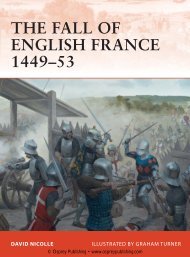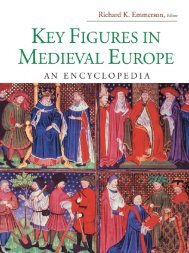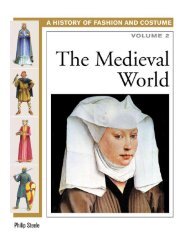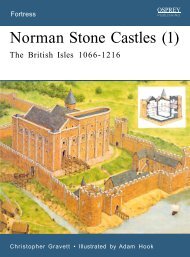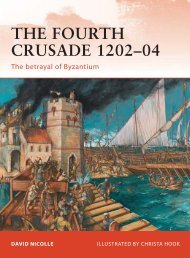Osprey - General Military - Knight - The Warrior and ... - Brego-weard
Osprey - General Military - Knight - The Warrior and ... - Brego-weard
Osprey - General Military - Knight - The Warrior and ... - Brego-weard
You also want an ePaper? Increase the reach of your titles
YUMPU automatically turns print PDFs into web optimized ePapers that Google loves.
were believed to be culturally inferior. During the 11th <strong>and</strong> 12th centuries it was<br />
common lor English writers to describe the barbarity <strong>and</strong> backwardness of these<br />
peoples. When the Scots raided into northern Engl<strong>and</strong> they were supposed to have<br />
killed men, women <strong>and</strong> children, spitting babies on the tips ol their spears <strong>and</strong> drinking<br />
blood. We have already seen how Aelred of Riveaulx, in his account of the Battle of<br />
the St<strong>and</strong>ard, dismisses the highl<strong>and</strong> Scots because they wore no armour; he concludes<br />
the speech with the suggestion that the Anglo-Norman forces fight not men but cruel<br />
beasts. Gerald of Wales' accounts of the Welsh <strong>and</strong> Irish are a little less colourful <strong>and</strong><br />
slightly more balanced, but even he emphasizes their lack of mercy to opponents,<br />
noting that whilst in France 'knights are taken prisoner, here [in Wales <strong>and</strong> Irel<strong>and</strong>]<br />
they are beheaded; there they are ransomed, here they are butchered'. He also records<br />
the shock of the Anglo-Norman forces when, after they defeated an Irish force at<br />
Ossory in 1169, their Irish allies started taking the heads of their slain enemies. <strong>The</strong><br />
same sorts of ideas <strong>and</strong> rhetoric were used for the peoples of the Baltic, Prussia <strong>and</strong><br />
Livonians, who were also beyond the chivalric boundary as pagans.<br />
Things were not so clear cut in the Latin East. <strong>The</strong> similarities between the martial<br />
aristocracies of Islam <strong>and</strong> Western Europe meant that the former, despite being<br />
'infidels', might be accorded treatment far more in keeping with chivalric ideals than<br />
were the Christian but less familiar warrior chiefs of, say, Gaelic Irel<strong>and</strong>. According<br />
to the mid-13th-century poem the Ordenede chevaLrie, a knight called Hugh of Tiberias<br />
won his freedom from the Muslims by instructing the Islamic leader Saladin about<br />
CHIVALRY: THE KNIGHTLY CODE -



